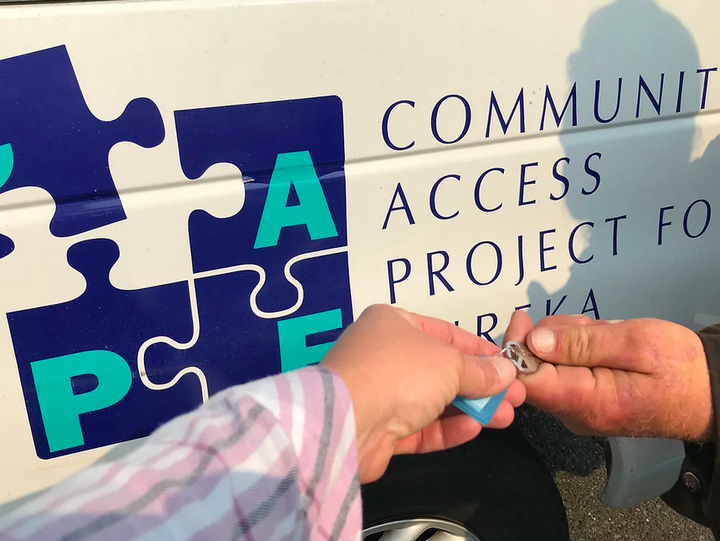The Community Access Project Eureka (CAPE)’s Uplift program is helping secure housing for the homeless | Photo from Uplift Eureka
###
Uplift Eureka – a program established through the city’s Community Access Project Eureka (CAPE) to support our local unhoused population – will soon be able to help around 100 homeless individuals get off of the streets, after receiving a $1,030,111 Emergency Solutions Grant (ESG-CV) aimed at mitigating the impacts on the homeless population created by COVID-19.
Jeff Davis, program coordinator for Uplift, told the Outpost that the funding will be used to expand and enhance Uplift’s outreach services and provide rapid rehousing and emergency shelters. More than $300,000 will go toward rapid rehousing — a low-barrier method of housing support that provides recipients with rental assistance and services. The funds can help cover deposits and rental costs for the tenants, Davis said, adding that the funding should be able to help rehouse up to 40 homeless individuals in Humboldt County.
Just like it sounds, rapid rehousing is meant to provide homeless people with housing quickly and without preconditions like employment or income. Of course, that can be difficult since landlords usually require verifiable income and rental history. Uplift helps homeless people overcome these barriers by working with landlords and management companies that are open to taking tenants who don’t meet those usual qualifications.
“It’s difficult because the City of Eureka doesn’t just have the properties for us to put them in city-owned properties,” Davis told the Outpost. “We’ve been doing rapid rehousing for the last three years, so we’ve really built a relationship with various management companies in town.”
The program offers landlord incentives, such as a sign-on bonus, for participating in the rapid housing program. Even more valuable, Davis said, is that Uplift provides ongoing support to help if a tenant is causing problems. “If there is an issue there, the landlord can call us up,” Davis said. “They have a whole support team.”
Though Uplift generally focuses on serving Eureka’s homeless community, the recipients of rapid rehousing assistance will be selected through the Humboldt Housing & Homeless Coalition’s coordinated entry system, meaning anyone experiencing homelessness in Humboldt County can potentially be eligible.
In addition to providing more rapid housing, the grant funding will go toward expanding Uplift’s outreach efforts, allowing Uplift to hire more staff, purchase medical supplies and add two additional outreach vehicles. Uplift staff often visit local homeless encampments to find people who need and want housing or services. The additional mobile outreach vehicles will act as offices of sorts, Davis said, allowing Uplift to assist people on site with services such as help obtaining a California I.D. or social security card, or signing them up for services such as CalFresh or Medi-Cal.
Uplift’s outreach efforts will also be expanded to focus more on emergency medical and mental health services. Davis said this expansion ties into the city’s long-term plan to develop an “alternative response team” to work with the Eureka Police Department. The concept, which many cities have implemented as part of police reform efforts, is to hire mental health specialists who can respond to 911 calls involving mental health crises.
The city is not ready to make those changes just yet, Davis said. But the hope is that Uplift’s outreach expansion will help lay the foundation by training some of these specialists so that by the time the EPD is able to have the mental health response team, they will already have experience in the field.
“A lot of this is going out and doing preemptive outreach with medical professionals, mental health clinicians, to go to encampments, go to where folks are and try to engage them and provide them with these services before these conditions worsen to the point where it requires a call for service or a trip to the emergency room,” Davis said.
Uplift will also use some of the grant funding to provide emergency shelter for homeless folks in need by providing them with motel vouchers, giving them a temporary place to stay indoors while Uplift works with them to secure more permanent housing. Finding emergency shelter space can be very difficult, Davis said, as the City of Eureka does not operate an emergency shelter and the local homeless shelters are often full. Also, because the Eureka Rescue Mission operates two different shelters – one for men and one for women and children – family units often have to be separated to move indoors. Sheltering people in motel rooms allows for couples and families to stay together.
Unlike the rapid rehousing program, people do not have to go through the coordinated entry system to move into the emergency motel housing. The rooms will be based on need, with Uplift conducting outreach to local homeless people, finding folks who need and want to get off the streets immediately/ Priority will be given to those with health issues.
The funding should cover rooms for about 60 individuals, Davis said. Though motel shelters are not a permanent solution, they provide a critical service, offering people a clean, warm and safe environment, thereby giving them an opportunity to secure more permanent housing or employment, he explained.
“It really helps to stabilize people while we’re searching for housing,” Davis said. “Everything is easier once you’re housed – once you have access to heat, a shower, running water, a toilet, a place where people can lock up their belongings and not have to worry if their possession will disappear while they’re gone.”
You can visit Uplift Eureka’s website for more information on the various programs and resources available to help homeless individuals secure housing and employment. If you are interested in the rapid rehousing program, you can sign up for the HHHC coordinated entry system by calling 2-1-1, or visiting 211humboldt.org.
The only requirement is that you are currently homeless.

CLICK TO MANAGE